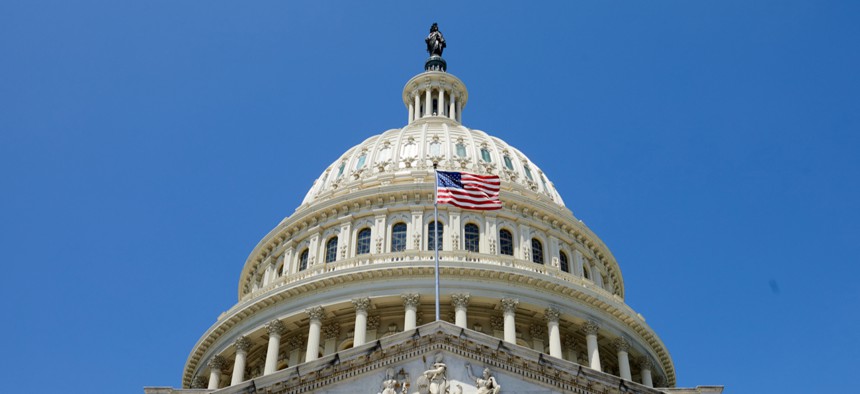
Kevin J. Frost/Shutterstock
Congress Will Not Block Mandated Union Contracts in Spending Bill
In a blow to labor groups, a provision blocking the implementation of collective bargaining agreements that have not been “mutually agreed to” by all parties does not appear in the final spending legislation.
When the compromise legislation setting agency funding levels for fiscal 2020 was formally published Monday afternoon, federal employee unions found a lot to like in the many provisions. The bipartisan agreement greatly reduced the chance of the government shutting down at the end of the week, and Republicans agreed to the average 3.1% pay raise for federal workers pushed by Democrats and employee groups.
However, one key priority for labor groups was left on the cutting room floor: a House-passed provision preventing agencies from implementing new collective bargaining agreements without union buy-in.
According to the House bill, which passed in June, agencies would be prohibited from using federal funding to implement any union contract that “was not mutually and voluntarily agreed to by all parties to the agreement or was not ordered following the completion of binding arbitration.” That language would have been retroactive to April 30, 2019.
In effect, the provision would have blocked all contracts imposed by the Federal Service Impasses Panel, a body that resolves disputes that arise during collective bargaining negotiations, and any contracts unilaterally imposed by an agency.
Unions had hoped that if enacted, the bill language would end a common practice in the Trump administration where they say agencies engage in “surface level bargaining” and rush through the collective bargaining process without meaningfully engaging in negotiations so they may declare an impasse and take the issue to the impasses panel, which is made up entirely of non-Senate confirmed Trump appointees. The provision also had the potential to slow the implementation of three controversial executive orders aimed at reducing the influence of unions at federal agencies.
Despite their failure to include the provision in the final bill, Democrats appear to have gotten one concession on that front: the Federal Labor Relations Authority is required within 90 days to submit a report to Congress “detailing the impact by agency” of the executive orders. Those orders aimed to shorten the length of performance improvement plans to 30 days, exempt adverse personnel actions from grievance proceedings, streamline collective bargaining negotiations, and significantly reduce the number of work hours and activities union members can spend on official time.
National Treasury Employees Union National President Tony Reardon said that despite the setback, he believes Congress has put agencies “on notice” about unacceptable negotiating practices.
“NTEU will continue to fight any agency decision that sabotages collective bargaining and tries to weaken employee rights and protections,” he said. “We also believe that any fair, impartial and thorough study of the impact that the administration’s three executive orders are having will show that they are undermining the collaborative and effective system of labor-management relations in the federal sector.”
Everett Kelley, national secretary-treasurer of the American Federation of Government Employees, touted the inclusion of an average 3.1% pay raise for feds, but said he was disappointed Congress did not do more to protect employees’ rights.
“Unfortunately, a provision passed by the House that would have prevented President Trump’s political appointees from unilaterally stripping federal employees of their collective bargaining rights was not included in the budget deal,” Kelley said. “AFGE will continue to fight for this legislation as our members’ rights remain under assault by this administration.”







